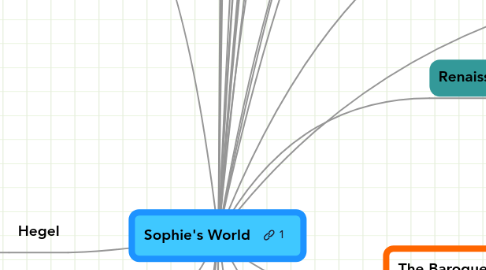
1. The Garden of Eden
1.1. Walking with friend home
1.1.1. Receives envelope
1.1.1.1. Who are you. First question. Might be a good start to the class.
1.1.1.1.1. Hildle Moller Knag and Sophie Amundsen
1.2. Enduring lesson
1.2.1. Questions we rarely ponder.
2. Page 372
3. The British Empiricists
3.1. We are what we experience
3.2. Locke and Tabula Rasa
3.2.1. Agreed with Descartes to a point
3.3. Hume
3.3.1. Impressions
3.3.2. Ideas
3.3.3. Complex ideas
3.3.4. Assignment Idea - Experiment on yourself doing the Harvard Associations test and explain your results through the eyes of Hume.
3.3.5. On the Cosmological argument
3.3.6. "is" and "Aught"
3.4. Berkeley
3.4.1. Felt Threatened by the increasing Materialistic movement
4. The Englightenment
4.1. Essentially, the empiricists and rationalists put into social action
5. Kant
5.1. Rose colored glasses
5.1.1. Time and space do not exist outside of ourselves
5.2. Belied in god was a practical matter for the sake of morality.
5.3. Categorical imperative
5.3.1. Solves the problem of how much to give.
5.4. What we perceive is shaped by our reason
5.5. I like the ball analogy
5.6. Brain trust behind the league of nations
6. Romantacism
6.1. Reaction to Kant
6.1.1. Personal expression and feeling
6.1.2. Hippies before their time
6.1.3. Wonder what the link is to fascism?
6.2. Organic
7. Hegel
7.1. Also had the idea of the spirit, but it lacked the spiritual aspect.
7.2. History as a river dialectic process
7.3. Three divisions of the world spirit
8. Innate ideas a myth
9. Can Also be considered "fatalism"
9.1. Evidence of fate in real life?
10. The Baroque
10.1. Love of the extravagant
10.2. Quiz question.. All the world is a stage quote. Philosophical question. What it contrasts to. Etc
10.2.1. Determinism
10.3. Theater, music, and a greater awareness that life was limited
10.4. One problem with materialism is the difficulty with finding a thought in the material form.
11. The Top Hat
11.1. The big questions presented
11.1.1. Where do we come from?
11.1.1.1. How must we live?
11.1.1.1.1. This is probably the best focus for the class.
11.2. E.L.
12. The Myths
12.1. Thor's hammer and myth explaining science
12.2. 570 BC Xenophanes first reek to question Greek mythology.
13. The Natural Philosophers
13.1. Early philosopher were really scientists.
13.1.1. Miletus Greek island
13.1.1.1. Thales
13.1.1.1.1. Traveled to Egypt observed natural phenomonon
13.1.1.2. Anaximander
13.1.1.2.1. "boundless" substance makes up things
13.1.1.3. Anaximenes
13.1.1.3.1. Air was the main ingredient of earth, water and fire
13.1.2. Heraclitus
13.1.2.1. All about flow
13.1.3. Parmenides
13.1.4. Empedocles
13.1.4.1. Earth, wind, fire water
13.1.5. Anaxagoras
13.2. Philosophy begins with wonder. If there is no curiosity, there is no point to discussing these matters.
14. Democritus
14.1. Why is the Lego ingenious?
14.1.1. Atoms are indivisible, immutable, and eternal
14.2. The first MATERIALIST
15. Socrates
15.1. Sophists
15.1.1. Relativism
15.2. Modesty, self-knowledge, Natural Truth
15.2.1. Socratic Method
16. Fate
16.1. Sophie finds Hilde's red scarf in her room.
17. Athens
17.1. Plato's idea world
18. Plato
18.1. The soul is different
19. The major's cabin
19.1. Cookie cutters that reflect forms. Can not shake a box of legoes and get a Lego horse.
20. Aristotle
20.1. Final cause
20.2. Question
21. Hellenistic period
21.1. Neoplatoism
21.2. Stoics, cynics and epicureans
22. The Indo-Europeans
22.1. Shared in their early polytheism
22.2. Semite influence
22.2.1. Emphasis on hearing over seeing.
22.2.2. Linear history
22.3. Jesus
22.4. Paul the Jew
23. The Middle Ages
23.1. Thomas Aquainas
23.1.1. Fused Aristotle (reason) with faith (bible) - Asserted that the two were not incompatible
23.1.2. Understanding nature is understanding God
23.2. Saint Augustine
24. Renaissance
24.1. We are playing parts and it is themaxhine of the subconscious that is driving us
24.2. Man is a process and becomes, different from the M.A. version of born to be doomed.
24.3. Birth of Empiricism - Theorizing and testing.
24.4. Convergence of the Arab, Eastern Christian and Western Christian Thought
25. Descartes
25.1. Rejected the mechanical view focused on mind body relationship.
25.2. Reconstructed his ideas from previous beliefs
25.3. Deconstruction of all he knew
25.3.1. Cogito ergo sum
25.4. On god... If a man can perceive of a perfect Devine being it must exist, other wise it would not have the quality of existence.
25.5. Qualatative ve and quantative
25.6. Duelism. Two parts
25.6.1. Matter - extension
25.6.2. Mind - consciousness
25.6.3. Lesson idea
